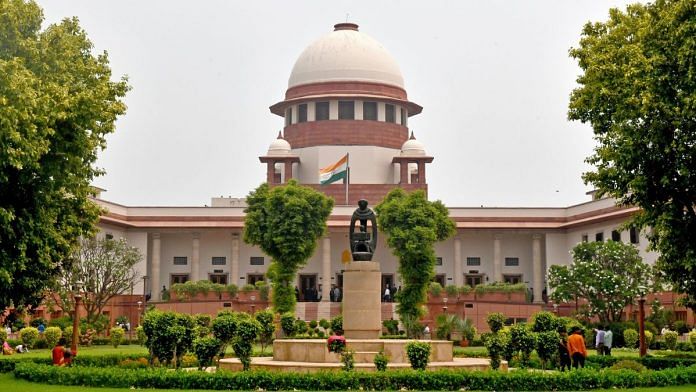New Delhi: The sub-classification of Scheduled Castes (SCs) and Scheduled Tribes (STs) furthers the actual purpose of reservation and ensures its trickle-down effect in the marginalised community, the Narendra Modi government has told the Supreme Court.
In its submissions before a seven-judge bench, Solicitor General Tushar Mehta maintained that the proliferation and deepening of reservation benefits was necessary.
He added since the legitimate aim behind reservation was to support the backward classes, who have had a history of discrimination for centuries, sub-classification of its benefit would go a long way to achieve this objective.
Led by Chief Justice D.Y. Chandrachud, the bench Tuesday commenced hearing a case, which will rule on whether sub-classification was permissible for SCs and STs.
The case arises out of a reference that was made to the bench in 2020 that expressed serious doubts about the correctness of the 2005 landmark E.V. Chinnaiah vs State of Andhra Pradesh judgment.
The 2005 verdict held that SCs were a “homogenous group”, and could not be sub-classified under the Constitution. A year later, the Punjab government passed a legislation which reintroduced “first preference” reservation for Balmiki and Mazhabi Sikhs, offering them the benefit before anyone else in the SC category.
This was struck down by the Punjab and Haryana High Court in 2010 in view of the Chinnaiah decision. Punjab challenged the HC decision in the top court, which in 2014 referred the matter to a five-judge bench.
In 2020, the debate over sub-classification of SC/ST was sent to a larger bench of seven judges to decide on whether states can make sub-classifications within the SC community.
Coming out in support of the stand taken by the Punjab government, the Centre contended Wednesday that sub-classification of SC/ST and other backward classes would provide it and the state government with the appropriate free-play to frame policy in “furtherance of the high constitutional ideal of social justice”.
Equality of opportunity operates at a “dual level” — one between open category and backward classes and secondly within backward classes interse — therefore, sub-categorisation would “achieve de-facto equality of opportunity”, the Centre said.
The Chennaiah ruling, the Centre stated “disempowers the State to frame appropriate policy” and this “diminishes constitutional guarantee of equality of opportunity”.
“It is stated that the lack of sub-classification perpetuates the zone of inequality within the reserved category and stops the State from framing appropriate policy in this regard,” submitted Mehta’s note given on the subject to the court. ThePrint has seen a copy.
Sub-classification among SC and STs will enable targeted policy-making by the state, and rationalise the affirmative action regime in the country, as it would focus on the more backward among the backwards to achieve the desired result of equality.
The constitutional vision of equality and equal opportunity was dynamic and evolving, not in substance but surely in form, the Centre said, drawing references from several earlier Supreme Court judgements that have dealt with the subject of reservation.
Sub-classification would not tinker with the finality of determination of SC and ST, an exercise that is carried out under Article 341 and Article 342 of the Constitution, the Centre submitted. It allayed the apprehension that sub-categorisation or classification would hinder the process of identifying SCs and STs.
There is a constitutional mandate under Article 341 (1) for the President to specify, by a notification, SCs/STs in a state. This is, however, in consultation with its Governor.
Clause (2) of Article 341 empowers Parliament to include or exclude from the list of Scheduled Castes specified in the notification issued by the President.
Also read: Karnataka govt puts ball in Centre’s court on SC sub-quotas. What is the issue & politics behind it
The Centre’s note refuted the argument that identification of SCs and STs and extending them reservation were two limbs of the same exercise. It said there was a fundamental difference in the exercise of identification and the exercise of extending reservations to the identified class.
“The said two exercises were sequential in nature and the process of identification, as encapsulated in Article 341/342, precedes the process of actual extension of reservations at the Central level or the State level,” it said.
As the Constitution permits reservations at the level of higher education, entry-level in the government service sector and promotion in the government services, persons who would most likely benefit from this earmarking of seats and posts would be persons who are relatively “forward” within the backward class, it said.
Advocating for an efficient distribution of reservation benefits, the government emphasised on the limitations of affirmative action.
It said such benefits were available but limited in nature and as seats and posts in higher institutions and government offices were limited, their distribution should be done rationally.
“Therefore, if the aim of the State and the Constitution is to provide parity, equality of opportunity and social and economic mobility of the backward classes/castes in need, enabling of sub-classification would ensure that benefits are extended to persons more in need of the said benefits by carefully apportioning the reserved quota within the reserved class,” the note said.
(Edited by Tikli Basu)
Also read: India’s Scheduled Caste list must be religion-neutral. Muslims, Christians are also Dalit



